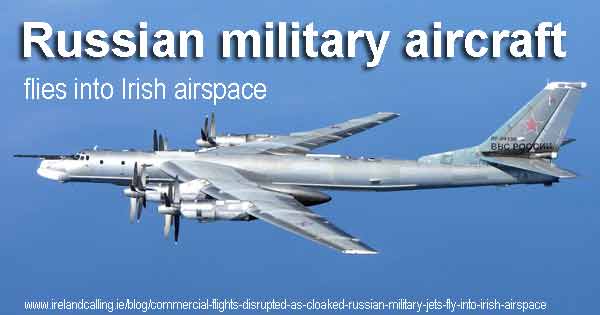Commercial planes had to be either delayed or diverted last month as Russian bombers flew into Irish airspace.
The jets, which were carrying hundreds of passengers, needed to be disrupted in order to prevent potential collisions with the two Russian bear bombers.

A report in the Irish Examiner says that the Russian Tu-95 bombers ‘cloaked’ their presence as they flew 40km off the Irish coast and criss-crossed into major civilian airline traffic lanes. These traffic lanes included incoming flights from North America.
The Irish Aviation Authority (IAA) confirmed that the Russian bombers flew at 8,200m around the west, south and east coasts of the country.
If an aircraft has transponders turned on then the air traffic controller will be able to determine several pieces of information about the plane such as size and location.
However, the IAA were notified by their British counterparts that the Russians had entered Ireland’s area of airspace control with their transponders turned off.
An IAA statement said: “The Russian military aircraft did not have their transponders switched on at the time.”
This caused the departure of one commercial aircraft from Dublin to be delayed. The authorities feared the Dublin aircraft may have flown into the Russian bombers, although they had by then moved into British controlled airspace.
The IAA added: “As a precautionary measure to ensure safety was maintained, the routing of one en route aircraft was changed to ensure that its track was sufficiently separated from the track of the two Russian military aircraft.”
Two weeks previously the Russians had flown 88km off the Irish coast. The Department of Foreign Affairs had spoken to the Russian Ambassador, looking for assurances that military aircraft wouldn’t fly into Irish-controlled airspace without notification.
However, this time they came much closer at just 19km outside Ireland’s sovereign airspace, still with the transponders turned off. Both times they also made their way into British airspace.
The Russians are thought to be sending a message to Britain telling them not to get involved in their internal affairs with Ukraine.
Irish Defence Minister Simon Coveney said: “I’d be surprised if it was a Russian tactic to upset Ireland, and the IAA managed the incident safely and effectively.”